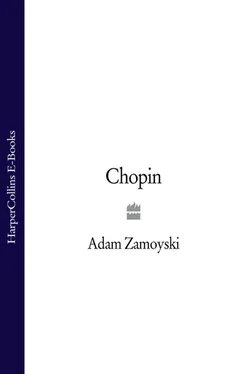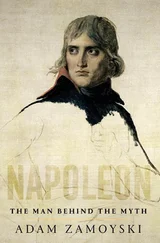This musical education was complemented by the music Chopin heard in homes and drawing rooms around Warsaw. Some of this was taken from the popular Italian operas of the day, but much of it was national in character. Polish piano music was dominated by the Polonaise, a musical form built on the rhythm of a slow, minuet-like court dance dating back to the sixteenth century. This rhythm had been familiar to many composers, including Bach, Telemann and Mozart, but they had merely used it as a tempo for melodies of their own. Towards the end of the eighteenth century Polish composers had begun to write Polonaises of a more authentic character. The trend was taken up by Prince Michał Kleofas Ogiński, a distinguished amateur composer, as well as the pianist Marya Szymanowska, and by the beginning of the nineteenth century the Polonaise had started a new life as a short piece for the piano.
Unsurprisingly, Chopin’s own first steps in composition took this form. By the age of seven he was already composing short pieces which Żywny would help him write out, as he had not yet mastered this skill. Few of these survive. Those that do are unremarkable, and are only impressive if the boy’s age is taken into account. It was in 1817 that Chopin’s first printed work appeared, privately published by Canon Cybulski of St Mary’s church, a friend of the Chopin family. It was entitled ‘Polonaise in G minor, dedicated to Her Excellency Countess Victoria Skarbek, composed by Frederick Chopin, a musician aged 8’. It is probable that his godfather, Count Fryderyk Skarbek, who had just returned from studies abroad and taken up a teaching post at Warsaw University, had helped to pay for this, which would account for the dedication to his sister. His godfather was also responsible for the article on Chopin which appeared in January 1818 in the Warsaw Recorder ( Pamiętnik Warszawski ) and hailed the young composer as ‘a true musical genius’. ‘Not only can he play with great facility and perfect taste the most difficult compositions for the piano,’ Skarbek wrote, ‘he is also the composer of several dances and variations which do not cease to amaze the connoisseurs.’ 9
The first known reference to Chopin’s appearance outside the family circle is to be found in the diary of a young lady who went to a soirée at Countess Grabowska’s, where ‘young Chopin played the piano, a child in his eighth year whom the connoisseurs declare to be Mozart’s successor’. 10Countess Grabowska, a friend of the Skarbeks, was the wife of one of the governors of Warsaw University, who was later to become Director of the Government Commission on Education. He belonged to a conservative patriotic milieu which had adopted a pragmatic approach to the realities of Poland’s position.
After Napoleon’s disastrous Russian campaign of 1812, the whole of Poland had been overrun by Russian troops, and Tsar Alexander was determined to hold on to as much of it as possible. At the Congress of Vienna in 1815 he managed to force through his solution to the Polish problem and created a small Kingdom of Poland whose constitutional king was the Tsar of Russia. It was a precarious compromise, and while many patriots regarded it as little better than captivity, a group of aristocrats worked at promoting the national cause within the limited autonomy it allowed.
The prime salon of this circle was that of the Blue Palace, the Warsaw residence of Count Stanisław Zamoyski. It was also the Warsaw home of his brother-in-law Prince Adam Czartoryski, whose close friendship with Tsar Alexander, distinguished diplomatic career and position as head of what was arguably the richest and most influential family in the Kingdom, made him a key figure in Polish society and politics. The Blue Palace was frequented by the most venerable figures of the past as well as the youngest members of the Polish aristocracy. Countess Zamoyska and her sister, Princess Marya of Württemberg, organised entertainments and thés dansants for children between the ages of eight and twelve, designed to instil good manners and patriotic values, which Chopin probably attended. 11
The Countess was also the founder of the Warsaw Benevolent Society, and it was not long before she recognised Chopin’s fund-raising potential. Julian Niemcewicz, the poet and Nestor of Polish literature, a devotee of the Blue Palace, describes a meeting of the Society in one of his one-act plays:
The Countess: You see how little money we have; all our efforts come to nothing. We are begging high and low, but everyone is deaf to us, or rather, to the voice of the poor. There is nothing for it but to carry on with our usual methods, but with certain modifications. I flatter myself that Monsieur Łubieński and I have perfected our techniques. There is to be a concert next Tuesday in which little Chopin is to play; if we were to print on the bills that Chopin is only three years old, everyone would come running to see the prodigy. Just think how many people would come and how much money we would collect!
All: Bravo! Bravo! A wonderful idea, excellent! Let us print on the bills that Chopin is only three years old!
Princess Sapieha: I think it would make even more of a sensation if we wrote on the bills that little Chopin will be carried in by his nanny.
All: Bravo! Bravo! What a capital idea, princess! 12
What was probably the first of these concerts took place on 24 February 1818. Whatever the bills may finally have said, the press notice actually gave Chopin an extra year, stating that he was nine. The concert took place in the ballroom of a public building often used for such events, the former Radziwiłł Palace, and Chopin played a concerto by the Czech composer Adalbert Gyrowetz. It was his first appearance before such a large audience, and almost certainly the first time he had performed a work of this length.
After this event Chopin’s fame spread throughout the capital, and it was not long before a carriage would draw up before the Chopin apartment to carry the eight-year-old boy off to the Belvedere Palace, the residence of Tsar Alexander’s brother Grand Duke Constantine, commander-in-chief of the Polish army. Constantine was a martinet who spent his days drilling his soldiers mercilessly, often forcing them to perform feats that could only end in their death or that of their horses. He epitomised everything that was grotesque and brutal about Russian rule in Poland, and he was universally reviled.
Nicolas Chopin was not one to allow sentiment to get in the way of his son’s prospects. It was an honour for the boy to be asked to play at the Belvedere, and a triumph when it turned out that he could soothe the Grand Duke’s notorious fits of temper with his playing. Chopin presented him with a military march of his own composition, and it was said the Grand Duke was so delighted that he had it scored for full military band and played at parades. What was more remarkable was that Chopin was not fetched merely to entertain the Grand Duke and his wife, but to play with his beloved natural son and Alexandrine de Moriolles, the daughter of his tutor. 13
Chopin’s was an unusual upbringing; from his sheltered home with its middle-class atmosphere, he was propelled into some of the most elegant drawing rooms in Europe, where he performed before the greatest personages in the country, was spoilt by their wives, and played on an equal footing with their children. He quickly acquired polished manners as well as an ability to feel at ease in the most exalted company and mix with any kind of person, and while he was sociable and a little precocious, he was not, by all accounts, conceited. There is a plausible anecdote relating to one of his first public appearances; when he returned home, his mother asked him what the audience had liked best, to which he is alleged to have replied: ‘My new English collar.’ Whether this is true or not, it is in character, as he would remain remarkably modest about his music throughout his life. This was largely the consequence of his father’s determination not to let his talent go to his head, and insistence on treating his son’s gift as a pleasant amenity rather than the central feature of his life. This redounds to Nicolas Chopin’s credit, consider ing how ruthlessly most child prodigies were exploited by their parents.
Читать дальше












